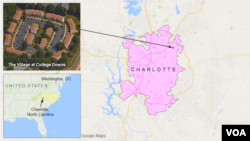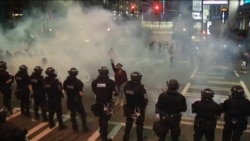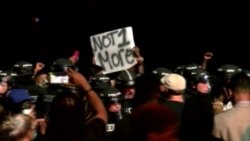One person was shot late Wednesday in the city of Charlotte, North Carolina, as protesters rallied for a second night in response to the police killing of an African-American man.
The governor of North Carolina declared a state of emergency in Charlotte and deployed National Guard troops in the city.
Early in the night there were peaceful marches, but they later turned violent with clashes erupting between police in riot gear and protesters. Officers fired tear gas to try to disperse crowds. Some people smashed store windows and set small fires in streets.
The situation was largely calm by the early hours of Thursday.
Dozens injured
The city government initially said someone was killed Wednesday night when shot by another civilian, not police, but later said that person was critically injured. Charlotte's police department said four officers were also hurt, none with life-threatening injuries.
On Tuesday, the first night of protests, there were about 24 people injured, including 16 police officers.
Mayor Jennifer Roberts appealed for calm, saying Charlotte has always been a place where people can have peaceful dialogue.
"This is not who we are," she said in an interview on CNN.
WATCH: Day 2 of protests in Charlotte
Conflicting reports of shooting circumstance
The protests come in response to Tuesday's shooting of 43-year-old Keith Lamont Scott at an apartment complex. Police said officers were looking for someone else when they saw Scott come out of a car with a gun, and that the officer fired after Scott ignored warnings to drop it.
Scott's family says he was unarmed, and was instead carrying a book when he was shot. Witnesses said he had his hands in the air.
Police body cameras captured the shooting, but the video has not been made public.
The case is the latest in a long string of police shootings that highlight the use of force by officers, particularly against African-Americans.
WATCH: Carolyn Presutti explains what led to protests
Protester frustration
Shootings have often been followed protests calling for police reforms and justice for those killed by officers.
In many cases the demonstrations are peaceful, but violence like that seen in Charlotte further adds to the debate over how people can best speak out against what they believe is wrong and the way police balance doing their jobs with allowing legally protected expression.
Braxton Winston, a protester in Charlotte, directed comments at the head of the city's police department and its handling of the situation.
"You constantly tell us what we cannot do. We cannot kneel. We cannot march. We cannot stand. We cannot sing. So what can we do. Chief Kerr Putney, come out and tell us what we can do," Winston said.
Obama reaches out
President Barack Obama spoke by phone Wednesday with Roberts and Mayor Dewey Bartlett of Tulsa, Oklahoma, where on Friday a white officer killed a black man.
The White House says all three leaders insisted any protests must be calm, and the president offered any assistance necessary to both cities.
A lawyer for the Tulsa police officer who shot 40-year-old Terence Crutcher said the officer feared for her life and fired when Crutcher reached through a window into his car.
But Crutcher's family says video shows the window was closed and that he had his hands on the car to show he had no gun.
Clinton, Trump weigh in
Democratic presidential candidate Hillary Clinton said Wednesday that the killings are "unbearable and need to become intolerable."
She said the country needs strength, love and kindness and that "we are safer when communities respect police and police respect communities."
Republican Donald Trump tweeted "the situations in Tulsa and Charlotte are tragic. We must come together to make America safe again." He said he hopes the violence and unrest in Charlotte comes to an immediate end.
The Washington Post has a project tracking the number of people killed by police in the United States, which sprang from a lack of full data in databases maintained by the federal government. As of Thursday, the Post had documented 706 people shot dead by police in 2016, 173 of them African-Americans.









